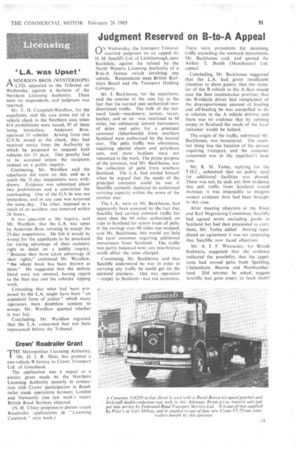Judgment Reserved on B-to-A Appeal
Page 33

If you've noticed an error in this article please click here to report it so we can fix it.
(IN Wednesday, the Transport Tribunal
reserved judgment on an appeal by H. M. Sutcliffe Ltd. of Littleborough, near Rochdale, against the refusal by the North Western Licensing Authority of a B-to-A licence switch involving one vehicle. Respondents were British Railways Board and the Transport Holding Company.
Mr. J. Backhouse, for the appellants, said the essence of the case lay in the fact that the normal user authorized twodirectional traffic. The bulk of the outward loads—machinery, cotton, rayon, leather, and so on —was restricted to 60 miles, but substantial inward movements of skins and pelts for a principal customer (Isherwoods) from southern Scotland were authorized by the normal user. The pelts traffic was obnoxious, requiring special sheets and polythene nets, and most hauliers were not interested in the work. The prime purpose of the journeys, said Mr. Backhouse, was the collection of pelts from southern Scotland. The L.A. had misled himself when he argued that the needs of the principal customer could he met if Sutcliffe correctly deployed its authorized carrying capacity within the terms of the normal user.
The L.A., went on Mr. Backhouse, had apparently been annoyed by the fact that Sutcliffe had carried outward traffic for more than the 60 miles authorized, on trips to Scotland for return loads of pelts, lf the carriage over 60 miles was stopped, said Mr. Backhouse, this would not help the local customer requiring additional moveMents from Scotland. The traffic was partly balanced now; any interference could affect the rates charged.
Continuing. Mr. Backhouse said that Sutcliffe understood he was in order in carrying any traffic he could get on the outward journeys. One way operation —empty to Scotland--was not economic.
There were precedents for incoming traffic exceeding the outward movements, Mr. Backhouse said, and quoted the Arthur T. Booth (Manchester) Ltd. appeal.
Concluding, Mr. Backhouse suggested that the L.A. had given insufficient attention to three points: that the transfer of the B vehicle to the A fleet would ease the fleet maintenance position; that the B-vehicle driver had complained of the disproportionate amount of loading and off-loading he was compelled to do in relation to the A vehicle drivers; and there was no evidence that by running empty to Scotland the needs of the local customer would be helped.
The origin of the traffic, submitted Mr. Backhouse, was immaterial. The essential thing was the location of the person requiring transport, and the customer concerned was in the appellant's base area.
Mr. R. M. Yorke, replying for the T.H.C., submitted that no public need for additional facilities was Oroved. There was not, he said, any firm evidence that pelt traffic from Scotland would increase; it was impossible to imagine weaker evidence than had been brought in this case.
After meeting objectors at the Road and Rail Negotiating Committee, Sutcliffe had agreed terms excluding goods to Scotland but had then proceeded to carry them, Mr. Yorke added. Having repudiated an agreement it was not surprising that Sutcliffe now faced objection.
Mr. A. J. F. Wrottesley, for British Railways, suggested that the evidence indicated the possibility that the appellants had moved pelts from Spalding, Cheltenham, Bourne and Northumberland. Did anyone, he asked, suggest Sutcliffe had gone empty to fetch them?




















































































































